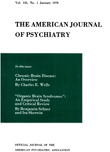Poverty and Mental Illness: Patients' Perceptions of Poverty As an Etiological Factor in Their Illness
Abstract
Fifty-nine percent of a state hospital sample of patients reported having experienced poverty. Social class was found to be inversely related to the experience of poverty but not to the feeling that it contributed to one's illness. Patients from higher social classes at times associated their illness with poverty more than did patients from lower social classes. However, patients experiencing poverty only in adult life reported that it contributed to their illness most often—more often than patients poor all their lives and much more often than patients poor only in childhood.
Access content
To read the fulltext, please use one of the options below to sign in or purchase access.- Personal login
- Institutional Login
- Sign in via OpenAthens
- Register for access
-
Please login/register if you wish to pair your device and check access availability.
Not a subscriber?
PsychiatryOnline subscription options offer access to the DSM-5 library, books, journals, CME, and patient resources. This all-in-one virtual library provides psychiatrists and mental health professionals with key resources for diagnosis, treatment, research, and professional development.
Need more help? PsychiatryOnline Customer Service may be reached by emailing [email protected] or by calling 800-368-5777 (in the U.S.) or 703-907-7322 (outside the U.S.).



